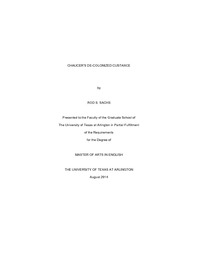
ATTENTION: The works hosted here are being migrated to a new repository that will consolidate resources, improve discoverability, and better show UTA's research impact on the global community. We will update authors as the migration progresses. Please see MavMatrix for more information.
Show simple item record
| dc.contributor.author | Sachs, Rod S. | en_US |
| dc.date.accessioned | 2014-07-14T20:31:15Z | |
| dc.date.available | 2014-07-14T20:31:15Z | |
| dc.date.issued | 2014-07-14 | |
| dc.date.submitted | January 2014 | en_US |
| dc.identifier.other | DISS-12741 | en_US |
| dc.identifier.uri | http://hdl.handle.net/10106/24493 | |
| dc.description.abstract | Chaucer's Man of Law's Tale (MLT) contains several non-Western views, religious practices, cultures and laws. Most importantly, within the MLT readers can discover an alternative to viewing non-Western people as enemies. By role-modeling the simple law of good, Custance becomes a hybridized queen who holds disparate contexts together. This essay blends postcolonial theory with decolonial options to show how Chaucer's Man of Law's Tale presents a less dehumanized narrative than most scholarship maintains, especially when compared to Nicholas Trive's version of the same story. Rather than vilifying the common foes of Christian Western Civilization, Chaucer's Custance demonstrates a de-colonization of cultural bias by living the law of good, which enables all who practice it to accept the differences of others. | en_US |
| dc.description.sponsorship | Gustafson, Kevin | en_US |
| dc.language.iso | en | en_US |
| dc.publisher | English | en_US |
| dc.title | Chaucer's De-colonized Custance | en_US |
| dc.type | M.A. | en_US |
| dc.contributor.committeeChair | Gustafson, Kevin | en_US |
| dc.degree.department | English | en_US |
| dc.degree.discipline | English | en_US |
| dc.degree.grantor | University of Texas at Arlington | en_US |
| dc.degree.level | masters | en_US |
| dc.degree.name | M.A. | en_US |
Files in this item
- Name:
- Sachs_uta_2502M_12741.pdf
- Size:
- 618.8Kb
- Format:
- PDF
This item appears in the following Collection(s)
Show simple item record


